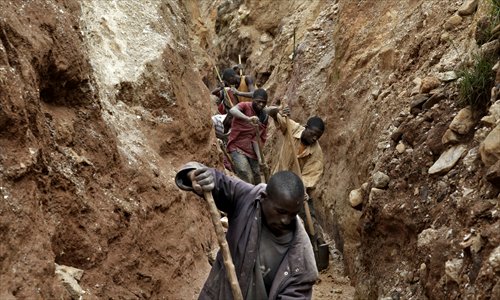Africa’s Asian trade dilemma
China and India contend for new markets

Miners work at cassiterite mine in Numbi, Congo. Photo: CFP
It is not clear if China and India are friends or rivals but within Africa, they are fierce competitors.
Indians first arrived in Africa as traders centuries ago, and large Indian communities formed during the British colonial period. Indians have been engaging with Africa economically through the setting up of manufacturing companies and industries dealing with food processing and machineries.
Despite a hiccup that saw Indians brutally expelled en mass from Uganda during the Idi Amin regime, the country's economy has for the past two decades been virtually run by Indians. They have dominated manufacturing, trade and service sectors, employing thousands of Ugandans. Indeed, Indian businesses are today among the largest taxpayers in Uganda.
Between 2010 and 2011, trade between India and Uganda hit $728 million. Uganda managed to export a paltry $17 million worth of goods and services to India, an indication that the balance of trade was hugely in favor of India. Pharmaceuticals such as drugs make up almost 30 percent of all the goods and services Uganda has been importing from India.
Mobile services
Among the largest Indian businesses in Uganda are Madhvani, Mehta, Mukwano and Ruparelia, which are owned by the famous PIO business groups. Other firms are Tata Coffee, Bank of Baroda and Airtel, which is one of Africa's largest mobile services provider.
Uganda's case is no different than Kenya's, whose volume of trade with India stood at $4.235 billion during the 2014-15 period. Out of this, India's exports were worth nearly $4.12 billion. According to the Kenya Bureau of Statistics, the main Indian exports to Kenya were pharmaceuticals, machinery, steel products, yarn, vehicles and power transmission equipment. On the other hand, Kenya sold soda ash, vegetables, tea, leather and metal scrap to India.
Beyond trade and investments, India has been one of Africa's favorite spots for students to pursue their further studies, particularly in health sciences and information technology. The High Commission of India in Nairobi says its government has offered thousands of scholarships to Kenyans since their cooperation began. In the 2014-2015 academic year, the commission says it offered more than 164 scholarships to Kenyan nationals.
However, the "warm and cordial" relationship between African countries and Indian is now under strain, and is poised to change in the near future. This follows the aggressive entry of China into Africa, which has seen most African states scaling down their trade and investment deals with India.
Manufacturing failure
Kenyatta University economics lecturer Charles Nzai blames the scaling down of trade and investments with India to Indian businesses failure to be innovative in their engagement with Africa. "They have been hardly outgoing in Africa. Indians focused on a narrow range of goods they traded in with Africa while their manufacturing sector remained sluggish at the time a new technology wave was sweeping across the globe. This left a gap, which is now being filled by the more ambitious Chinese companies," Nzai said.
He says that beyond innovativeness, China is economically more dynamic than India. This explains why Indian businesses are no longer in the construction, a sector they once were major players in Africa. Instead, India has opted to concentrate on telecommunications, financial services, food processing and tourism where it seems to have a comparative advantage over China.
This, however, does not guarantee China a soft landing in some African countries as it seeks to out-compete its Asian counterpart. In countries such as Tanzania, India's wellknown soft power, which stems from culture and its working democracy, gives it an edge over China. According to analysts, China's political system is to some degree its undoing in some African countries which are deeply influenced by the US and European political systems.
Analysts say it is difficult to tell who could emerge as a winner in the long run as the two countries battle for business in Africa. This, they say, is due to the fact that China and India use different investment and trade models. There are also fundamental differences between their cultures, political systems and economic development approaches.
Most of the Chinese businesses operating in Africa today are large, State-owned companies while the typical Indian enterprise in Africa is relatively small and usually owned and run privately. In some instances, they are a mix of private and public ownership.
New markets
Aly-Khan Satchu, an independent business analyst in Nairobi says due to these differences, the Chinese and Indian businesses operating in Africa perceive risks from different angles. "Chinese firms in Africa have proven to have a higher appetite for risky investments and that is why they are fast at entering into new markets such as South Sudan," he says, pointing to their size, which insulates them to some degree from risks compared to smaller, private firms.
This is not the case with the Indian firms. "They rarely enter into green [new] markets, and if they do, it is through mergers or acquisitions of already established businesses," said Mr Satchu.
But Mahesh Patel, the chairman and owner of the Tanzania-based Export Trading Group (ETG) that trades in food commodities however disagrees with this thought.
The Kenyan-born businessman of Indian origin observes that these strategies are not cast in stone. "It all depends on the business plans in an enterprise. The smarter the strategies, the easier it is for a business to outcompete others. That is why ETG has grown from a humble background in 1982 to covering more than 30 African countries today," said Patel.
He argues that real or imagined competition should not be a worry for Indian or Chinese firms. "What is key is the creation of value for shareholders and impacting positively on the wellbeing of society," he said.
The author is a Nairobi-based freelance writer. mkapchanga@gmail.com